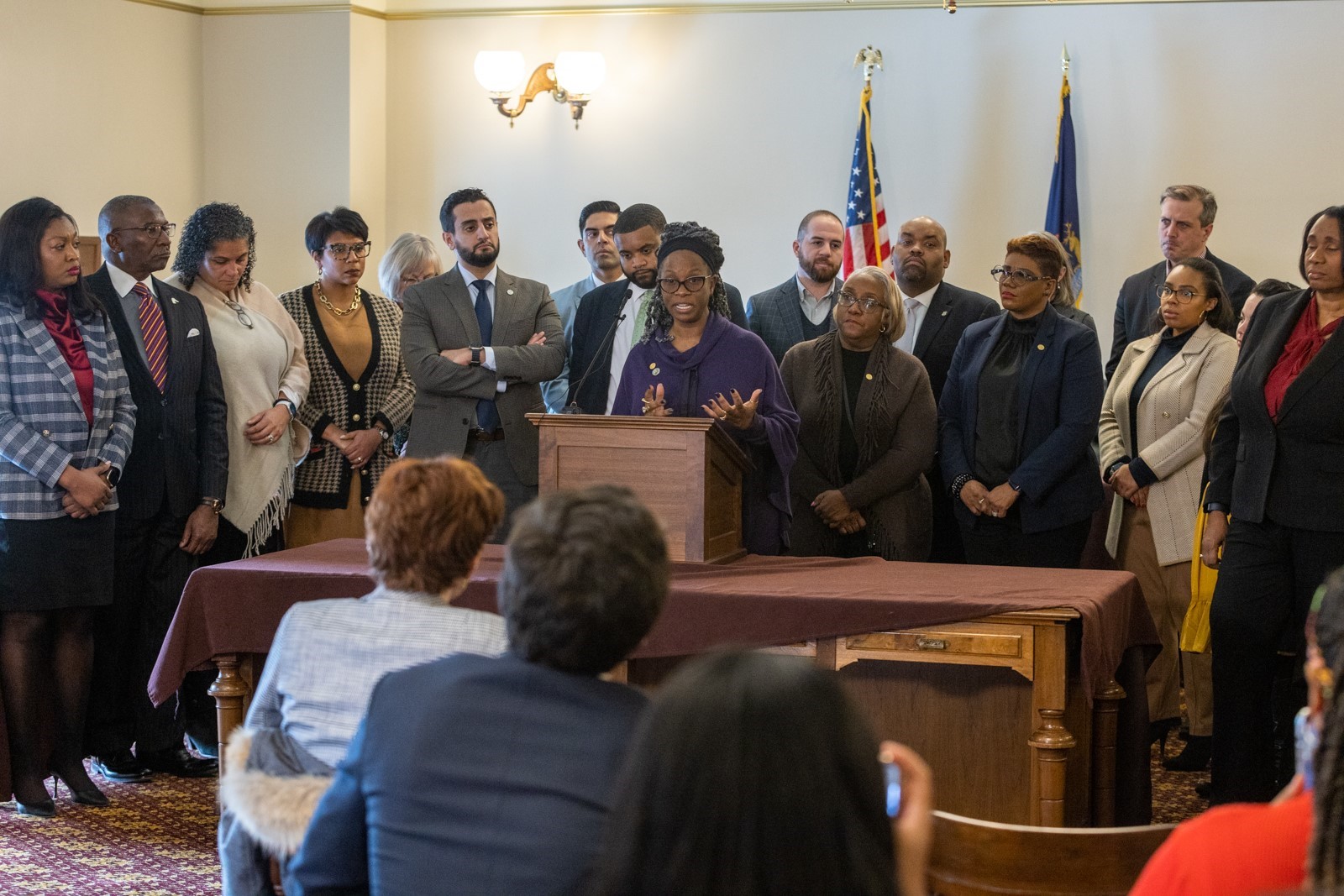Senate Democrats recognize Black history and celebrate impact of the Michigan Legislative Black Caucus
February is a month dedicated to celebrating and recognizing the contributions of Black people — Black History Month. What began as “Negro History Week” in 1926 by Carter G. Woodson has evolved into a month-long observance that has influenced generations. This commitment to inclusivity and cultural pride has also found its place in Michigan.
The story of the Michigan Legislative Black Caucus (MLBC) begins with a group of lawmakers who gathered at Rep. Morris Hood’s Detroit home. In 1976, they established the caucus, which has served the residents of Michigan for several decades.

Sen. Erika Geiss joins the 2023 class of the Michigan Legislative Black Caucus for a press conference at the state capitol, where the group outlined their priorities for building a more equitable and inclusive Michigan.
Through their collective efforts, the caucus has achieved numerous milestones. One significant achievement was the instrumental role they played in passing the legislation that solidified Martin Luther King, Jr. Day as a state holiday in 1985. Almost 30 years later, Rep. Morris Hood, Jr. made history as the first African American lawmaker to chair the Michigan House Appropriations Committee in 1997. Continuing this legacy, MLBC First Vice Chairperson Sen. Sarah Anthony (D-Lansing) became the first Black woman to chair the Senate Appropriations Committee in 2023.
Today, the MLBC is a coalition of 30 state legislators from the House and Senate committed to ensuring that all citizens of our state have equal opportunities. The connection between the MLBC and the current Michigan Legislature is evident and consistent. What is truly remarkable is that their work has not ceased as societal dynamics and systemic inequalities demand that their efforts continue.
Following what the media called “the year of the racial reckoning” in 2020, corporations, local leaders and community members were called upon to address the historical roots of systemic racism and its barriers. Members of the MLBC played a critical role in bridging these gaps through policies focused on health, education and generational wealth distribution.
Sen. Sarah Anthony speaks on the Senate floor in support of her bill — the CROWN Act — to end hair discrimination in Michigan and ensure that all Michiganders are able to embrace their natural hair.
One notable achievement in 2023 was the passage of the CROWN Act in Michigan, championed by Sen. Anthony. This legislation ensures that natural and protective hairstyles are respected.
MLBC members also continued the legacy of moving the entire state forward on recognizing important aspects of Black history, with Sen. Sylvia Santana (D-Detroit) leading the successful charge to finally establish Juneteenth as a state holiday in Michigan. The bill passed with bipartisan and nearly unanimous support.
Pivotal work by MLBC members goes beyond legislation. For example, the establishment of the Black Leadership Advisory Council by executive directive was based on legislation introduced by MLBC Chairperson Sen. Erika Geiss (D-Taylor) when she was a member of the House. Sen. Geiss was also a member of the Michigan Department of Licensing and Regulatory Affairs task force to require implicit bias training for licensed health care professionals in the state.
Equity was also a key focus in the 2024 state budget thanks to the leadership of elected officials like Sens. Anthony, Geiss and Santana.
The education budget for 2024 included money to provide all students with free breakfast and lunch, significant increases in the foundation allowance, full funding for special education programs, a 50% funding increase for English-Language Learners and the introduction of the first-ever Opportunity Index to improve school funding equity based on students’ economic needs. Also, thanks to a state budget supplemental bill Democrats passed in November, local school districts in Pontiac, Benton Harbor, Muskegon Heights and Ypsilanti will be able to pay off their financial debts. The bill also provided funds to pay off the legacy debt of the former Willow Run Community Schools and Inkster Schools.
The Michigan Department of Health and Human Services budget, crafted by Sen. Santana as chair of the subcommittee, included a shift to focusing on impacts on disadvantaged communities regardless of where they reside in the state and funding for the Healthy Moms, Healthy Babies program to improve maternal and infant health.
Furthermore, the budget allocated funds for well-rounded curriculum, teaching diverse histories to foster understanding among students of all races and ethnicities. It also made substantial investments in community violence intervention, gun violence prevention, cultural awareness training for police departments and support for minority-owned businesses and food and agriculture ventures started by people of color.
These investments have made communities of color feel seen, heard and acknowledged in ways they may never have before. Black History Month holds immense significance, but it also exposes the systemic barriers and inequalities that Black communities still face today. In light of this, members of the MLBC, along with the entire Michigan Senate Democratic Caucus, are committed to uplifting those within the African diaspora.
We stand on the shoulders of exemplary Black figures in history, acknowledging the reach and resilience of Black excellence. Their contributions should no longer be hidden and deserve to be fully recognized in textbooks, despite efforts in various states to erase this history from classroom curriculums. While Black History Month is a national celebration, it is crucial to remember that every day of the year is an opportunity for reflection and continuous learning about diverse cultures.
Read more from the Michigan Senate Democrats at SenateDems.com/press.
